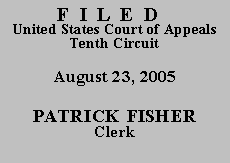

| UNITED STATES OF AMERICA,
Plaintiff-Appellee, Defendant-Appellant. |
No. 04-3336
(D.C. No. 04-CR-10052-JTM) (Kansas) |
Mr. Antunez first contends the district court's use of his prior conviction for illegal investment constitutes a violation of Blakely v. Washington, 124 S. Ct. 2531 (2004). Specifically, Mr. Antunez submits that Blakely requires the fact of a prior conviction to be alleged in the indictment and proved to a jury beyond a reasonable doubt. We disagree.
In Blakely, the Supreme Court applied the rule it expressed in Apprendi v. New Jersey, 530 U.S. 466 (2000), to Washington state's determinate sentencing regime. Blakely, 124 S. Ct. at 2536. Subsequent to briefing in the instant appeal, the Court extended Apprendi and Blakely to the federal sentencing guidelines, holding that the Sixth Amendment requires "[a]ny fact (other than a prior conviction) which is necessary to support a sentence exceeding the maximum authorized by the facts established by a plea of guilty or a jury verdict must be admitted by the defendant or proved to a jury beyond a reasonable doubt." United States v. Booker, 125 S. Ct. 738, 756 (2005) (emphasis added). To remedy the guidelines' Sixth Amendment violation, the Court severed and excised 18 U.S.C. § 3553(b)(1), which required sentencing courts to impose a sentence within the applicable guidelines range, subject to departures in limited circumstances. Id. at 764-65. As a result, the guidelines are now advisory in all cases. Id. at 769. In addition, the Court expressly stated that its "remedial interpretation of the Sentencing Act" must be applied "to all cases on direct review." Id. Thus, we evaluate Mr. Antunez's appeal in light of the Court's holding in Booker.
In this case, the facts that increased Mr. Antunez's penalty beyond the statutory maximum are facts of prior conviction, for which Apprendi, Blakely, and, most recently, Booker, make specific exception. See id. at 749. As we noted recently, a guidelines enhancement based on the fact of a prior conviction simply does not implicate the Sixth Amendment concerns on which the holdings of either Blakely or Booker were based. United States v. Gonzalez-Huerta, 403 F.3d 727, 738 (10th Cir. 2005) (en banc). Nevertheless, Mr. Antunez's sentence does implicate Booker's remedial holding, which makes the guidelines advisory in all cases pending on direct review. See id. at 731-32.
Because Mr. Antunez raised a Blakely challenge to the constitutionality of his sentence before the district court, his argument on appeal is subject to review for harmless error under Rule 52(a) of the Federal Rules of Criminal Procedure. United States v. Labastida-Segura, 396 F.3d 1140, 1142-43 (10th Cir. 2005). Rule 52(a) provides that "[a]ny error, defect, irregularity, or variance that does not affect substantial rights must be disregarded." Fed. R. Crim. P. 52(a). The district court committed error, albeit unknowingly, by sentencing Mr. Antunez under guidelines which it viewed as mandatory. As this court has held:
Although the Supreme Court indicated that not every guideline sentence contains Sixth Amendment error, and not every appeal requires resentencing . . . in this case (where the error was properly preserved) we cannot conclude that the error is harmless. Here, where it was already at the bottom of the guidelines range, to say that the district court would have imposed the same sentence given the new legal landscape (even after consulting the Sentencing Guidelines in an advisory capacity) places us in the zone of speculation and conjecturewe simply do not know what the district court would have done after hearing from the parties. Though an appellate court may judge whether a district court exercised its discretion (and whether it abused that discretion), it cannot exercise the district court's discretion.
Labastida-Segura, 396 F.3d at 1143 (internal citations omitted). Because Mr. Antunez was sentenced at the bottom of the guidelines range and the government has failed to proffer any argument that application of the guidelines as mandatory was harmless, this case requires a remand for resentencing in accordance with Labastida-Segura.
Mr. Antunez also argues that the district court erred by classifying his prior state conviction for "illegal investment" as a "drug trafficking offense" pursuant to § 2L1.2(b)(1)(B). In Shepard v. United States, 125 S. Ct. 1254 (2005), the Supreme Court recently further restricted the "fact of a prior conviction" exception to the rule of Apprendi.(1) We need not reach any issues connected to the classification of Mr. Antunez's prior conviction, however, because we have already determined that the case must be remanded for re-sentencing. See United States v. Cano-Silva, 402 F.3d 1031, 1038-39 (10th Cir. 2005).
For the foregoing reasons, we VACATE Mr. Antunez's sentence and REMAND the case to the district court for resentencing in accordance with both Booker and Shepard.
SUBMITTED FOR THE COURT
Stephanie K. Seymour
Circuit Judge
*.After examining appellant's brief and the appellate record, this panel has determined unanimously that oral argument would not materially assist the determination of this appeal. See Fed. R. App. P. 34(a)(2) and 10th Cir. R. 34.1(G). The case is therefore submitted without oral argument. This order and judgment is not binding precedent, except under the doctrines of law of the case, res judicata, or collateral estoppel. The court generally disfavors the citation of orders and judgments; nevertheless, an order and judgment may be cited under the terms and conditions of 10th Cir. R. 36.3.
1.In Shepard v. United States, 125 S. Ct. 1254, 1257 (2005), the Supreme Court held that, for purposes of determining whether a prior burglary conviction qualifies as a "violent felony" under the Armed Career Criminal Act (ACCA), 18 U.S.C. § 924(e), "a later court determining the character of an admitted burglary is generally limited to examining the statutory definition, charging document, written plea agreement, transcript of plea colloquy, and any explicit factual finding by the trial judge to which the defendant assented."